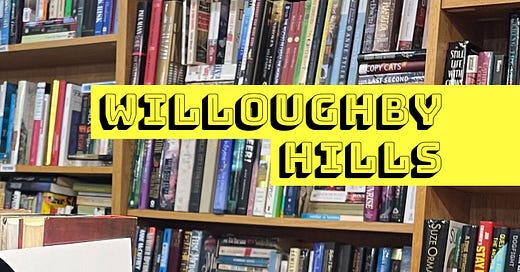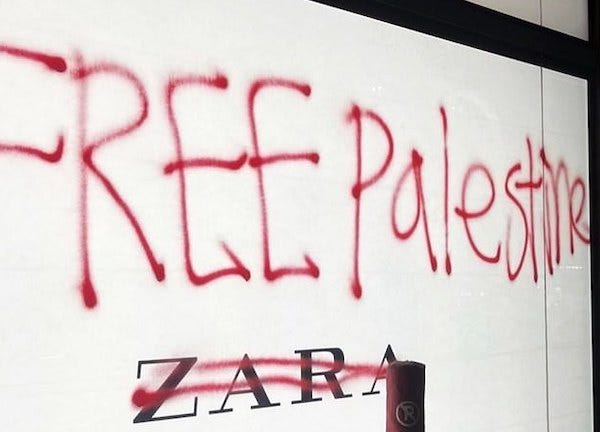Wednesday Walk: Fellow Bookworms
Zara changes course, building community through books, podcast updates
Welcome to Willoughby Hills!
If you enjoy what you’re reading, please consider a free subscribtion to receive emails every Wednesday and Sunday plus podcast episodes every two weeks. There are also paid options, which unlock even more features.
As is typical every Wednesday, I’m bring you a smattering of topics that I hope will make you a bit more curious about the world around you and give you something to think about later. I call these Wednesday Walks, as it’s the type of conversation we might have walking down a path in the woods. Shall we take a stroll?
Zara Folds
On Sunday, I wrote about some of the long-standing problems with fast fashion retailers that include the likely use of forced labor in China and major environmental pollution. Zara played a big role in my essay because in addition to the problems common to all fast fashion companies, last week Zara launched a new ad campaign that seemed to evoke images of the genocide in Palestine.
People spoke out quickly to boycott of Zara, causing the retailer to change course. As of yesterday, all imagery from the campaign has now been pulled from their social media and website.
According to CNN, quoting a Zara spokesperson, the campaign was conceived of in July and shot in September. But as I said on Sunday, there’s the content of the ad and then there’s the context. Even if the content was decided on months ago, the context into which the ad was received helped prompt major criticism.
As part of the backlash, the Zara store in Montreal was tagged with graffiti, while demonstrations were also held at stores in Madrid and Stockholm.
In a statement, a Zara representative seemed to dismiss the criticism and not acknowledging why the campaign could be problematic:
“Unfortunately, some customers felt offended by these images, which have now been removed, and saw in them something far from what was intended when they were created. Zara regrets that misunderstanding and we reaffirm our deep respect towards everyone.”
As I outlined on Sunday, this ad campaign is just another reminder to avoid fast fashion as much as possible.
Amazon Can’t Do That!
In case you missed it, on Monday, there was a worldwide strike intended to show solidarity with the Palestinian people.
The goal of the strike was to try to impact the world economy, to put enough sand in the gears of capitalism that the system no longer functions as it should. The hope was that if business leaders feel the pain, perhaps politicians will too and they will act accordingly.
The strike was very active in many Muslim majority countries including Lebanon, Turkey, Jordan, Iraq, and Qatar. It also was observed in parts of the U.S. with large Muslim populations, including New Jersey and Michigan.
While the official strike has ended, I think the spirit of it is worth honoring in the days to come. I will be doing my best to attempt to opt out of capitalist systems as much as possible. This includes not buying unnecessary stuff but also means limiting the use of banking systems and even streaming services.
For the items that I have to buy, I will be opting to purchase from local businesses over big chains and trying to support small producers over national food brands.
Quite frankly, even absent the current situation in the Middle East, this was an action that I’ve been trying to take for a long time. I hate how much control Amazon and other similar large companies have over our lives and how much of our paychecks they’re taking each month.
One change I made a few years ago is shifting to reading books from my local library rather than buying them. The downside to this of course is it doesn’t support the authors in the same way financially, but there’s an environmental upside to not printing and shipping so many physical books. Plus my bookshelves are already quite packed.
Being more intentional about where things come from has also led to some unexpected moments of community.
Last week, I returned a library copy of
’s amazing book The Cost of Free Land: Jews, Lakota, and an American Inheritance, which I had read before interviewing her on my podcast a few weeks ago.When I returned the book, the woman behind the circulation desk asked me what I thought of it. I of course raved about the book. We then began chatting and she told me that her husband had taken an interest in Lakota culture a few years ago and had learned a few words in Lakota. I shared with her how Rebecca wove both Lakota and Yiddish words throughout her text, which I felt gave depth to both the Indigenous and Jewish stories she was telling.
Another woman working at the circulation desk mentioned that she had heard about Rebecca’s book too and it had been on her reading list. She was happy to hear that I liked it and it renewed her interest in reading the book.
I tend to be more of an introvert and am especially cautious about discussing my podcast or newsletter with people I meet in real life. Something about it just feels oddly promotional in a way that’s never made me comfortable.
But after sharing with the two librarians, I felt safe to reveal that side of me. “If you’re interested, I actually just interviewed Rebecca Clarren on my podcast.”
This, of course, led to their surprise that I had a podcast and they wanted to know more. I wrote down the title of the show and my name.
As I left the library, I was thinking about how that human element is completely missing when we download a book on a Kindle or click “Buy Now” and the item mysteriously arrives at our door a day later in a blue and white envelope.
My interaction with the librarians wasn’t long, but it was meaningful. I shared a book recommendation with them and they seemed grateful for my take. They learned about a podcast they hadn’t heard of that is made just down the road.
If I can opt out of a global commerce system (as much as possible) and build a resilient community in my backyard, I don’t really see a compelling reason to go back to the big retailers, other than to save a few bucks.
I acknowledge that this perspective comes from a place of privilege and recognize that many people have no choice but to consider the bottom line. Since I am in a position to support local, I will.
Whether the goal is to stand in solidarity with Palestinians, to opt out of the destructive sides of capitalism, or to keep money in your neighborhoods, simplifying and keeping things local are good lessons for all of us to remember, myself included.
Podcast Reminder
This is an off week for Willoughby Hills, which means it’s an on week for the
podcast that I’m now producing. We have a great new episode out on Thursday with Amanda Gelender, an American Jewish woman who was raised in a very progressive family and synagogue that also was very Zionist.She has spent nearly 20 years uncoupling Zionism from Judaism and is now a prominent anti-Zionist activist. If you’re not already, please sign up for the Here4TheKids Substack to receive podcast alerts and interesting writing.
Willoughby Hills returns next week with a very interesting conversation with author Andrew Leland. He was diagnosed with retinitis pigmentosa as a young man and has spent the last 20 or so years slowly losing his vision.
Andrew’s new memoir The Country of the Blind: A Memoir at the End of Sight not only chronicles his own acceptance of his blindness, but also looks at some of the larger issues affecting the blind community.
If you’re interested in starting Andrew’s book now in preparation for next week’s episode, it’s a fantastic read that I highly recommend! And remember, members get early access to the podcast, so if you’d like to upgrade your membership and help support my work, please consider doing that too.
I publish new issues every Wednesday and Sunday. Sign up to always receive the latest issue and support my work:
Other Wednesday Walks
If you’ve missed past issues of this newsletter, they are available to read here.







